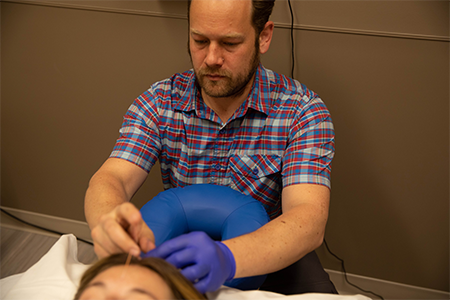Acupuncture
Acupuncture is the most well known practice in Traditional Chinese Medicine, which is based on restoring the flow of energy throughout the body. This energy is known as the life force and referred to as qi or chi (pronounced chee).
Acupuncture sessions encourage the body to naturally heal itself by rebalancing qi, the life force that enlivens body, mind and spirit. Fine needles are placed in points to restore balance and nourish the essential functions of the organs. Research has shown it to be helpful for many conditions, including pain syndromes, cancer treatment-related side effects, gastrointestinal disorders, addictions and headaches.
Auricular (Ear) Acupuncture
Auricular Acupuncture is performed by a simple technique technique done by placing small sterile needles in the ear and left in place for about 45 minutes. This Acu-detox, or NADA, protocol was developed to reduce symptoms of patterned behavior, addictions, cravings and substance abuse withdrawal management. You may experience an immediate calming, reduced anxiety, better sleep and improvement in physical, emotional and mental outlook. It is applicable to many stress-related conditions such as: pain, eating disorders, inflammatory conditions, cravings for smoking, drugs and alcohol, mood swings and irritability, depression and sadness, as well as, post-traumatic stress disorders and general tension. It may also used in combination with reflexology for optimal results.
Frequently Asked Questions
How to prepare for your appointment
Plan to arrive on time or even a little early to ensure your acupuncture session is a soothing experience. Wear something comfortable and loose (for example, t-shirt, shorts, sweatpants) Please keep jewelry to a minimum and refrain from wearing excessive make-up or strong perfumes or colognes. If you would like, have a light meal or snack before your appointment to help prevent feeling lightheaded afterwards.
What happens during the session?
The first 15-20 minutes of your initial consultation will consist of a one on one, in depth conversation. The practitioner will need to get a full medical history including past and current health issues and concerns. Following the intake, the practitioner will examine your pulse and tongue, and will palpate the abdomen and areas of muscular discomfort. Once a diagnosis is determined, the practitioner will begin the indicated treatment consisting of a variety of modalities including the insertion of fine needles in various points throughout the body, heat applications, and massage.
How many treatments will I need?
There is no definitive answer to this question. The frequency of treatments will vary from person to person depending on the diagnosis, your age and health, and how well you respond to the treatment. Acute problems generally require less time and frequency of treatment. For example, an acute spasm may require only one or two treatments, whereas more chronic or severe conditions may require several treatments. Acupuncture is a natural medicine that supports the body in rebalancing itself. It can be a gradual process. Consulting with an experienced practitioner about you and your condition will offer the best guide for the duration of the treatment plan.

